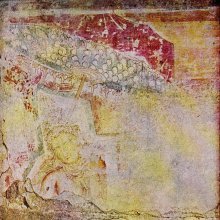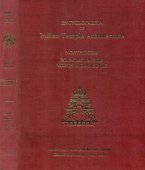Vakataka, Vākāṭaka: 3 definitions
Introduction:
Vakataka means something in Hinduism, Sanskrit, the history of ancient India. If you want to know the exact meaning, history, etymology or English translation of this term then check out the descriptions on this page. Add your comment or reference to a book if you want to contribute to this summary article.
Images (photo gallery)
India history and geography
Source: Wikipedia: India HistoryVākāṭaka (वाकाटक).—The Vakataka empire was a Brahmin dynasty from the Indian subcontinent that originated from the Deccan in the mid-3rd century CE. Their state is believed to have extended from the southern edges of Malwa and Gujarat in the north to the Tungabhadra River in the south as well as from the Arabian Sea in the west to the edges of Chhattisgarh in the east.
Little is known about Vindhyashakti (c. 250 – c. 270 CE), the founder of the family. The Vakatakas are noted for having been patrons of the arts, architecture and literature. They led public works and their monuments are a visible legacy.
Source: What is India: Inscriptions of the VākāṭakasVākāṭaka (वाकाटक) were one of the most glorious dynasties that flourished in South India in ancient times. Their empire at one time extended from Mālwā and Gujarāt in the north to the Tuṅgabhadrā in the south and from the Arabian Sea in the west to the Bay of Bengal in the east. They were great patrons of literature. The liberal patronage they gave to Sanskrit and Prakrit poets soon brought the Vaidarbhī and Vacchomī rītis into prominence and induced great poets like Kālidāsa to adopt them for their works.
There was unprecedented religious activity in the age of the Vākāṭakas. The founder of the royal family was the Gṛthapati Vākāṭaka, who was a follower of Buddhism. [...] The descendants of this Gṛhapati Vākāṭaka changed their religious faith and became staunch supporters of the Vēdic and Purāṇic religion. They were guided in this by a pious Brāhmāṇa family of Vallūra. This family maintained its reputation for Vedic learning for several generations.2 Its founder was Yajñapati, who was probably a contemporary of the Vākāṭaka king Vindhyaśakti. [...] Most of the Vākāṭaka princes were devotees of Śiva. So the temples of that god must have been mush larger in number than those of other deities. [...] Temples dedicated to Viṣṇu also were not rare. Buddhism also was flourishing in the kingdom of the Vākāṭakas. It had perhaps a greater attraction for those who an account of some calamities befalling them were convinced of the transitoriness of health, worldly possessions and life.
The Vākāṭakas were Brāhmaṇas of the Viṣṇuvṛddha gotra. Their feudatories who ruled over the Mēkalā country traced their descent from the Pāṇḍavas2 of the lunar race and evidently claimed to be Kṣatriyas, The rulers of Mahākāntāra (modern Bastar District of Madhya Pradēsh and the adjoining territory) claimed descent from the famous king Nala. They also must have been regarded as Kṣatriyas. In some other cases such as those of the rulers of Śarabhapura and Ṛṣika we have no means to ascertain their caste.

The history of India traces the identification of countries, villages, towns and other regions of India, as well as mythology, zoology, royal dynasties, rulers, tribes, local festivities and traditions and regional languages. Ancient India enjoyed religious freedom and encourages the path of Dharma, a concept common to Buddhism, Hinduism, and Jainism.
Languages of India and abroad
Sanskrit dictionary
Source: Cologne Digital Sanskrit Dictionaries: Monier-Williams Sanskrit-English DictionaryVākāṭaka (वाकाटक):—[from vāc] m. [plural] Name of a family of princes, [Inscriptions]
Sanskrit, also spelled संस्कृतम् (saṃskṛtam), is an ancient language of India commonly seen as the grandmother of the Indo-European language family (even English!). Closely allied with Prakrit and Pali, Sanskrit is more exhaustive in both grammar and terms and has the most extensive collection of literature in the world, greatly surpassing its sister-languages Greek and Latin.
See also (Relevant definitions)
Full-text (+44): Pravarasena, Sarvasena, Pravira, Vindhyashakti, Kundala, Vatsagulma, Vishrutacarita, Kanakavalaya, Angada, Prithivisena, Suvarnakara, Padampura, Ajanta, Rudrasena, Mridanga, Devasena, Narendrasena, Lokaprakasha, Damodarasena, Ramagiri.
Relevant text
Search found 12 books and stories containing Vakataka, Vākāṭaka; (plurals include: Vakatakas, Vākāṭakas). You can also click to the full overview containing English textual excerpts. Below are direct links for the most relevant articles:
Impact of Vedic Culture on Society (by Kaushik Acharya)
Sanskrit Inscriptions (A): The Vākāṭakas < [Chapter 3]
Sanskrit Inscriptions (D): The Kaṭāccuris / Early Kalācuris < [Chapter 3]
6. Sacrifices With Political Significance < [Chapter 2]
Expansion of the Gupta Empire < [July-August, 1929]
Expansion of the Gupta Empire < [May-June, 1929]
Frescoes from Kerala < [March-April 1931]
A Historical Study of Kaushambi (by Nirja Sharma)
Pallava period (Social and Cultural History) (by S. Krishnamurthy)
Origin of Sculptural Art (c): Pallava period < [Chapter 2 - Origin of Sculptural Art—Its Development and Scheme]
Stringed instruments (Tata) < [Chapter 4 - Material Culture of the People]
Household Articles (d): Flower-basket (Pushpa-puta) < [Chapter 4 - Material Culture of the People]
Stupas in Orissa (Study) (by Meenakshi Chauley)
During the Gupta period < [Chapter 2]
Lakulisha-Pashupata (Philosophy and Practice) (by Geetika Kaw Kher)
Nisvasasamhita and Saiva Initiation of the kings < [Chapter 2 - Spread and Transition]
Related products

